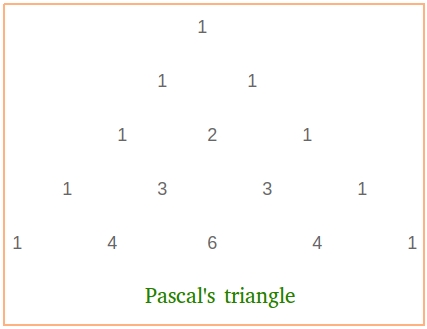Pascal's triangle
The Pascal's triangle, named after Blaise Pascal, a famous french mathematician and philosopher, is shown below with 5 rows.

There is a nice Pascal's triangle calculator on this page that you can play with in order to see the Pascal's triangle for up to 99 rows.
Some Important things to notice
- The first row starts with 1.
- Starting with row #2 and every single row after, the row starts with 1 and ends with 1.
- The number 2 in the third row is found by adding 1 and 1 in the second row.
- The two 3s in the fourth row is found by adding 1 and 2 and 2 and 1 in the third row.
- The number 4 in the fifth row is found by adding 1 and 3 in the fourth row. The number 6 in the fifth row in found by adding 3 and 3 in the fourth row.
You can indeed keep building more rows by doing just that. It is not that complicated. If we add another row, this is how the Pascal's triangle will look like.
1
1 1
1 2 1
1 3 3 1
1 4 6 4 1
1 5 10 10 5 1
1
1 1
1 2 1
1 3 3 1
1 4 6 4 1
1 5 10 10 5 1
We show the expansion of 4 binomials when n = 0, 1, 2, and 3.
You can really see the coefficients when n = 1, 2, and 3. When n = 0, it is just the number 1 that we put on top on row #1.
(a + b)0 = 1
(a + b)1 = a + b = 1a + 1b
(a + b)2 = a2 + 2ab + b2 = 1a2 + 2ab + 1b2
a3 + 3a2b + 3ab2 + b3 = 1a3 + 3a2b + 3ab2 + 1b3